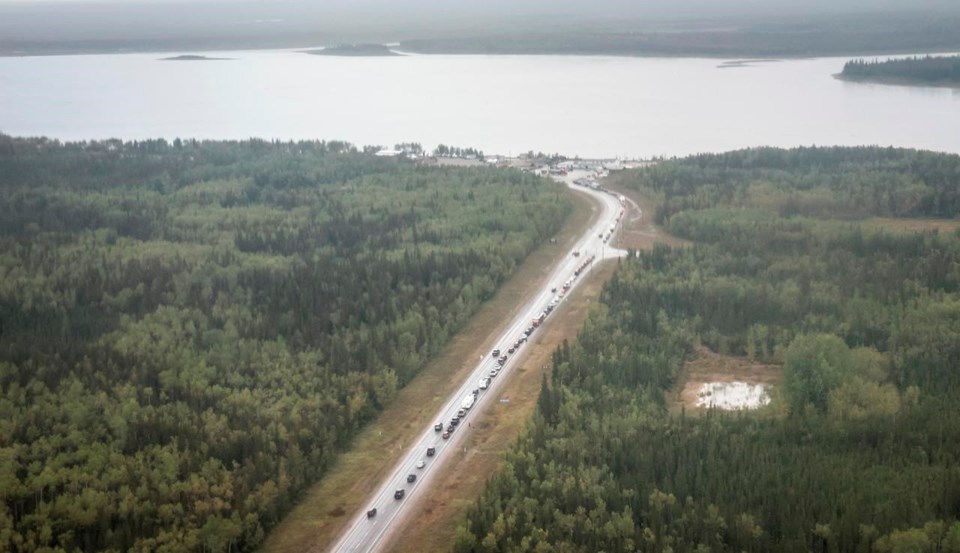YELLOWKNIFE — More than 19,000 people left Yellowknife in less than 48 hours as one of the largest firefighting mobilizations in the history of the Northwest Territories continued to protect the city from an encroaching wildfire.
"I described today as another marathon sprint," Yellowknife Mayor Rebecca Alty said Friday evening.¬Ý
"It‚Äôs draining and, unfortunately, it‚Äôs not letting up yet."¬Ý
Territorial officials said about 15,000 residents had streamed out of the city in vehicles. Another 3,800 left by air on flights.
They urged anyone left in the city to go to the airport, where a Canadian Armed Forces Hercules plane was waiting on the tarmac ready to fly to Manitoba.
About 2,600 people were still in Yellowknife ‚Äî 1,000 of them essential workers.¬Ý
Alty said earlier in the day that stragglers needed to pack up and head south. "We don't need volunteers and we don't need vigilantes driving around watching for fires."
Shane Thompson, the territory's minister of environment and climate change, said the wildfire situation remained critical and those who stay endanger themselves and others. The highways and airport could be compromised, he added.
"Please get out now," Thompson said.¬Ý
The evacuation was announced Wednesday with a deadline to have people out by Friday at noon.¬Ý
"It's a ghost town," said Kieron Testart, who was going door to door in the nearby communities of Dettah and NDilo to check on people.
The streets were nearly empty and once-busy stores were closed.
In Yellowknife, a grocery store and a pharmacy remained open Friday morning — as did a bar, where exhausted workers were gathering at the end of long shifts. They weren't expected to be open much longer.
"It's kind of like having a pint at the end of the world," Testart said.¬Ý
The last gas station closed Friday afternoon.
Cooler temperatures and humidity helped firefighters hold the blaze 15 kilometres from the city's outskirts. But there was no rain.
“For the first time in awhile, we got a little bit of help from weather," said fire information officer Mike Westwick.
Eleven air tankers were flying, with another plane dropping fire retardant. A 10-kilometre fire line was dug, backed up by 20 kilometres of hose and a plethora of pumps — "the most extensive heavy water operation we've ever seen in the territory," Westwick said.
The forecast means the good news is unlikely to last, he added. The weekend is set to see high temperatures, winds and no precipitation.¬Ý
"It‚Äôs a marathon, it‚Äôs not a sprint ‚Ķ we are dealing with a very big fire," he said.¬Ý
The risk of the fire reaching the city this weekend has fallen, Westwick said, but the fire was still dangerously close.With the evacuation almost complete, crews could focus their attention on keeping the fire at bay.
Several other communities in the territory, including the town of Hay River, ordered thousands of residents out within the past week. Evacuees continued to check into evacuation centres across Alberta on Friday.
Prime Minister Justin Trudeau met with some at an evacuation centre in Edmonton and said he hopes the situation in Yellowknife doesn't become "the worst-case scenario."
He said he recognized the long journeys evacuees have made.
"Being there to help out each other and look out for each other is really the best of not just what Canada is, but particularly people who live in the North where the sense of community and looking out for each other is truly extraordinary," Trudeau said.¬Ý
Etienne Cumlepen and his Rottweiler, Axel, left Hay River and were staying in Peace River, Alta., about 490 kilometres northwest of Edmonton.¬Ý
Cumlepen, who moved from South Africa in the late 1990s, builds winter roads in the N.W.T. to help get supplies to remote communities. He was working in Alberta when the evacuation of his town was ordered Sunday.¬Ý
‚ÄúWe‚Äôre stuck here and we‚Äôre not sure when we‚Äôre able to go back, or what we will find when we go back," he said.¬Ý
Stuart York said he had a feeling he would have to flee Yellowknife the day before the evacuation was ordered. He drove a camper with his wife, two daughters and two dogs to Peace River, leaving the rest of their possessions in the evacuation zone.
"We got a lot of roots there and it’s all left behind in the house."
There were 236 fires burning in the territory, which was not alone dealing with a fire crisis Friday.
In Kelowna, –°¿∂ ”∆µ, a state of emergency was declared as the city's airport was shut down and thousands more West Kelowna residents were ordered to leave their homes in the face of a fast-burning wildfire roaring through the surrounding hills.
This report by The Canadian Press was first published Aug. 18, 2023.
— By Kelly Malone in Saskatoon, Bob Weber in Edmonton and Jamin Mike in Peace River, Alta., with files from Bill Graveland in Calgary
The Canadian Press




